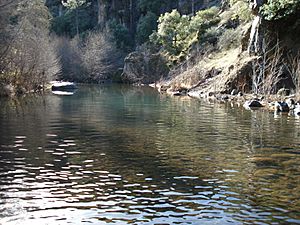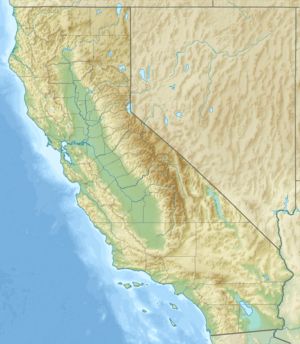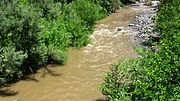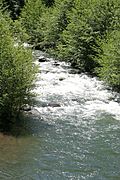Battle Creek (California) facts for kids
Quick facts for kids Battle Creek |
|
|---|---|

Battle Creek in January 2007
|
|
|
Location of the mouth in California
|
|
| Country | United States |
| State | California |
| Physical characteristics | |
| Main source | Confluence of North Fork and South Fork Near Manton, California 868 ft (265 m) 40°25′23″N 121°59′49″W / 40.42306°N 121.99694°W |
| River mouth | Sacramento River Southeast of Anderson 338 ft (103 m) 40°21′19″N 122°10′33″W / 40.35528°N 122.17583°W |
| Length | 47 mi (76 km) |
| Basin features | |
| Basin size | 365 sq mi (950 km2) |
| Tributaries |
|
Battle Creek is a creek in California, about 16.6-mile-long (26.7 km). It flows through Shasta and Tehama counties. This creek is a very important branch of the Sacramento River.
The eastern part of the Battle Creek area is in the northern Sierra Nevada mountains. This area then changes into the southern Cascade Range. The parts of the creek that are still natural have many different kinds of plants and animals. Many small streams that feed Battle Creek start from underground springs.
Amazing Wildlife in Battle Creek
Battle Creek is home to several types of fish. You can find Chinook salmon here. There are also steelhead, rainbow, and brown trout. These fish are an important part of the creek's ecosystem.
Protecting Battle Creek
There is a big project to help the fish in Battle Creek. It is a $67 million effort to restore the Chinook salmon. This project is part of the PG&E Battle Creek Hydroelectric Project. Many areas next to the creek are protected. This means they cannot be developed or built on. This helps keep the creek and its surroundings natural.
People also watch the water quality in Battle Creek. A group called the Citizen’s Water Monitoring Project has been collecting data since 2009. They check the water both upstream and downstream. This helps make sure the water stays clean and healthy for the fish and other wildlife.
A Bit of History
Battle Creek got its name from an event in 1849. This was when a battle happened between Native Americans and early white trappers. The name remembers this historical event.
 | Jewel Prestage |
 | Ella Baker |
 | Fannie Lou Hamer |




